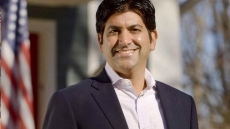At least 70 people were killed and 79 injured by armed assailants who forced their way into a university in northeastern Kenya and opened fire at students on Thursday, a senior government official said.
Interior Cabinet Secretary Joseph Nkaissery said 79 people have been injured and four terrorists shot dead in the ongoing operation inside Moi University's Garissa campus, Xinhua news agency reported.
Sporadic exchange of gunfire could be heard late Thursday in the university compound between the insurgents inside and the security forces outside.
The Al Shabaab terror group, which has links to the Al Qaeda network, has claimed responsibility for the 5.30 a.m. raid, saying it was holding many Christian hostages inside.
"We have killed many people and Kenyans will be shocked when they get inside," they said in their radio station.
Earlier, speaking to journalists, Nkaissery said the institution has 815 students and 60 members of staff.
“The security agents have managed to account for 280 students and all the members of staff," he said.
The attack started at dawn from the mosque inside the campus where the attackers shot at worshippers indiscriminately.
Students who escaped the gunfire said there were at least five attackers.
Boinnet earlier said there was a shootout between the attackers and the police officers who were guarding the students' hostels.
"The attackers shot indiscriminately while inside the university compound."
"However, the attackers retreated and gained entry into the hostel... a joint force composed of National Police Service Commission (NPS) officers and other security agencies arrived and are engaged in an elaborative process of flushing out the gunmen from the hostels," he said in a statement posted on his Twitter account.
Kenya Defence Force (KDF) and police entered the university's compound.
Local security officials said there had been threats on the institutions there from terror groups.
"We had the threats earlier and had alerted the institutions here," a security official said.
There has been heightened security around the country, particularly along the border, with security agencies at an unprecedented state of alert amid latest reports that the Al Shabaab has planned attacks against Kenya in protest over Nairobi sending troops to southern Somalia.
Meanwhile, Kenyan police on Thursday circulated a photo of a senior Al Shabaab leader, whom they believe is behind the attack.
The police placed a $54,350 bounty on the head of Mohamed Kuno, who is Al Shabaab's military commander in Lower Juba region in southern Somalia. He is currently in charge of external operations against Kenya.
"He (Kuno) commands the militia along the border and is responsible for cross-border incursions in the country. In the recent past, he has intensified attacks in Northern Kenya and Coast region, particularly in Garissa, Mandera, Lamu," the police said.
Sources said the suspect was aided by two local youths to conduct surveillance on the Moi University Garissa campus.
According to police, Kuno is believed to be very religious and has been a Madrassa teacher for several years. He worked for Al-Haramain Foundation between 1993 and 1995 before the institution was closed. At that time he was known as Sheikh Mahamad.
The suspect later became a teacher and principal at Madarasa Najah in Garissa from 1997 to 2000, where his extremist tendencies became more manifested. He thereafter joined Al Shabaab after being motivated by the ideology of Islamic Courts Union (ICU) to establish an Islamic statehood in Somalia.
It is reported that the majority of the terror attacks in Garissa were carried out by former students of Madarasa Najah. Most of the recruits were drawn from close family members and clan mates.
Police said Kuno used the ideals of caliphate governance to persuade and recruit his students to join the ICU and later to join Al Shabaab.
The militant group had established a unit in every region of Somalia, and Kuno was charged with carrying out attacks against foreign troops.
He is also credited with having an extensive terrorist network within Kenya, particularly at the Dadaab refugee camp. Kuno claimed responsibility for last year's bus attack in Mandera in which 28 people were killed.
AL SHABAAB: WHO THEY ARE
The militant group Al Shabaab (The Youth in Arabic), that has claimed responsibility for Thursday's deadly attack on a university in Kenya that left at least 70 people dead, has been battling the UN-backed government in Somalia, and has carried out a string of attacks in neighbouring Kenya.
The group, which is allied to the Al Qaeda, has been pushed out of most of the main towns in Somalia it once controlled, but it remains a potent threat.
It emerged as the radical youth wing of Somalia's now-defunct Union of Islamic Courts, which controlled Mogadishu in 2006, before being forced out by Ethiopian forces.
It is banned as a terrorist group by both the US and Britain and is believed to have between 7,000 and 9,000 militants.
Thursday's attack on the Moi University Garissa campus is the deadliest in a series of attacks it has carried out in neighbouring Kenya.
At least 70 people were killed and 79 injured in the early morning attack while 535 still remained unaccounted for.
In 2013, Al Shabaab attacked the Westgate shopping centre in Kenya's capital Nairobi leaving at least 68 people died.
Al Shabaab has also set up a recruiting network in Kenya, especially around the port city of Mombasa, which has a large Muslim population.
Although it has lost control of most towns and cities, it still dominates in many rural areas.
It was forced out of Somali capital Mogadishu in August 2011 and left the vital port of Kismayo in September 2012.
The loss of Kismayo has hit Al Shabaab's finances, as it used to earn money by taking a cut from the town's lucrative charcoal trade.
Al Shabaab advocates the Saudi-inspired Wahhabi version of Islam, while most Somalis are Sufis.
It has imposed a strict version of Islamic Sharia law in areas under its control, including stoning to death women accused of adultery and amputating the hands of thieves.
In a joint video released in February 2012, former Al Shabaab leader Ahmed Abdi Godane said he "pledged obedience" to Al Qaeda head Ayman al-Zawahiri.
The two groups have long worked together and foreigners are known to fight alongside Somali militants.





